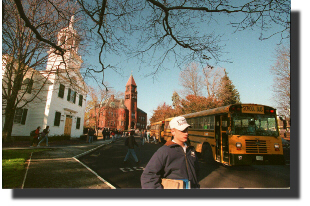
©Globe Newspaper Company 1995

©Globe Staff Photo/Mark Wilson
Students leave Pinkerton Academy
in Derry, N.H., yesterday at the end of the school day.
The Globe's People's Voice coverage of citizen concerns in Derry,
N.H., continues with a look at citizen concerns over financing public
education.
DERRY, N.H. -- Jim and Pat MacEachern staked their claim to the American
Dream here five years ago, when they moved to a colonial home on a leafy
street and planned to start a family.
Before long, James was born. But then local taxes shot up, the school budget was cut, and the MacEacherns were shelving plans to expand their family in order to send James to private school.
''We've made the decision to have just the one child right now and it's been a real hard one,'' Jim MacEachern said. ''The schools in this town were a big, big factor in our decision to move here. Quite frankly, it was a real shock when we saw what started happening to the system.''
Although the MacEacherns say they remain generally pleased about their move from Greater Boston, their plight underscores the financial unease many New Hampshire families are experiencing, despite an improving economy.
Moreover, the MacEacherns' status -- a hard-working family feeling the middle-class squeeze -- is likely to be a crucial factor as the nation's spotlight turns to New Hampshire and its presidential primaries next year.
Both of the MacEacherns say they are likely to vote in the Republican nominating contest on Feb. 20. But like many other Derry residents who took part in a Globe poll and a focus discussion group, the MacEacherns have been dissatisfied with the political system and the traditional candidates who run for president.
Three years ago, for instance, Pat MacEachern cast a ballot for independent presidential candidate Ross Perot. And Jim said he would have voted for Perot, and not President George Bush, if only he had thought the Texas billionaire had a better chance of winning.
''He wasn't on the inside,'' Pat said, explaining her vote for Perot. ''He wasn't trying to make anyone happy. He just wanted to run the government like a business and get things back on track.''
Neither of the MacEacherns has chosen a candidate from the 10 now running for the Republican nomination, in part because none appears to be addressing their chief concerns.
Jim said he is waiting for a candidate who will make ''core educational issues'' a top priority, while Pat says she is waiting for a candidate who can convincingly demonstrate a capacity for decisive leadership.
''I'm looking for someone who isn't flip-flopping, who can make decisions and not be an embarrassment,'' she said.
At the same time, both MacEacherns worry about the influence of right-leaning Christian organizations on the Republican Party.
''It's either their way or the highway, and that's very troubling,'' Jim said. ''They don't seem to be willing to negotiate and come to some common ground. I myself have many strong opinions, but I'm willing to go into the gray zone.''
That the MacEacherns have such strong reservations about the direction of politics should cause concern among political leaders because the family in many ways embodies a civic ideal.
Jim, a technical engineer who commutes to his job at an AT&T plant in Massachusetts, serves in a voluntary capacity on the town's planning board, where he has been working to extend a growth management ordinance designed to control runaway residential development and demand on the town's schools.
''I feel an obligation to my family and the town to get involved,'' Jim said. ''If you're going to stay someplace you should be part of the solution, not part of the problem.''
Pat, a homemaker who once worked in a nearby department store, recently helped compile a cookbook of Derry recipes that was used to raise money to build a new playground.
In addition, for the last two years, since the day after cuts in school programs were announced, Pat has worked as a volunteer teacher's aide in the public schools.
But Pat's willingness to play a hands-on role in local elementary education stems from not only from a sense of civic duty, but also from a desire to personally evaluate a classroom environment available to her son.
''Even though my son wasn't going to be in the system for another three years I needed to get in there to see what the cuts were going to do,'' she said.
James currently attends a private preschool program and the MacEacherns are trying to decide whether to keep him there -- and pay the increased tuition required for grade school -- or send him to public school.
''If the decision is to go private, my wife will have to go back to work,'' Jim said.
Today, although school budget cuts have been restored, and Pat is impressed by the dedication of public school teachers, the MacEacherns seem to be leaning toward the more expensive private school.
The principal reason is that neither Jim nor Pat can envision the battle over local property taxes, which funds the schools, ending anytime soon.
''I would hate to see our son go into the schools and have the
services
one year and not have them the next,'' Jim said. ''We really can't continue
with this up and down pattern.''